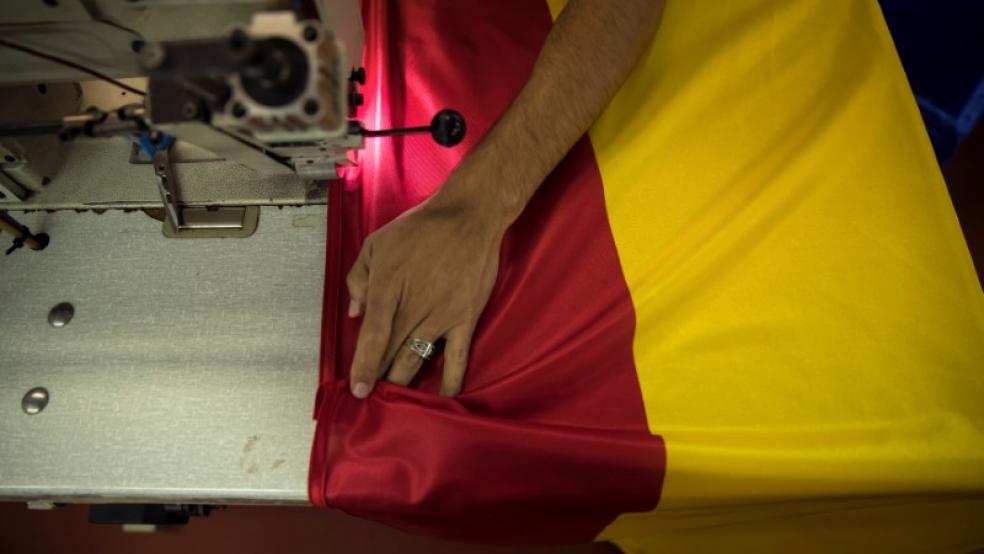MADRID (Reuters) - At Jose Luis Sosa-Dias's factory near Madrid, lengths of bright red and yellow polyester are being steamed and pressed as workers rush to rebuild stocks of the Spanish flag after a huge surge in sales in the last few weeks.
Patriotic displays of the flag are rare in Spain, where it still reminds many of the Franco dictatorship. But Catalonia's bid for independence has fired up national sentiment, and with it demand for flags. "We sold about 35,000 flags in 50 days. Normally we might sell 500 or 600 in a month," said Sosa-Dias, who is originally from Uruguay. "In the 38 years I have been in Spain it is the first time I have seen so many flags on balconies and houses, and at demonstrations as Spaniards said 'I am Spanish'."Such displays reflect a rising nationalism that is encouraging Prime Minister Mariano Rajoy to stick to his tough line against Catalonia. It also makes it harder to reach a compromise with the region.That nationalism was on display when hundreds of thousands of Spanish unionists staged protests in Madrid and Barcelona in support of unity after Catalonia's illegal independence referendum on Oct. 1 triggered a constitutional crisis and clouded prospects for Europe's fifth-largest economy.According to a monthly official opinion poll, the level of concern among Spaniards over the situation in Catalonia increased threefold in September compared with August.And while a majority say they feel they have both national and regional identities, 66 percent support Rajoy's refusal to offer more autonomy to the country's 17 regions, according to the poll.Among voters who back Rajoy's People's Party, this number jumps to 86 percent."Conflict around national identity is moving from Catalonia to the rest of the country," said Lluis Oriols, associate professor of politics at Carlos III University in Madrid.He said the government could therefore conclude there are gains to be made from taking a hard line."UNITY AT STAKE"This new willingness to wave the national flag has not been accompanied by a resurgence in far-right nationalism, despite attempts by Catalan secessionists to associate Spanish nationalism with Franco-style fascism.Only a very few people parading with the national flag have given fascist salutes and the unionist demonstrations were instead attended by families with children draped in the flag.The flag has a long history. Its basic design of broad red and yellow stripes has been the same since 1785, with changes confined to its coat of arms. But until now it has been rare to see it displayed by the public, except on sports-related occasions.Flag sellers in the capital say demand during the Catalan crisis has far exceeded sales when Spain won the soccer World Cup in 2010 and sports fans filled the streets."We have doubled, tripled, quadrupled what we sold for the World Cup, honestly we lost count," said Angel Paniagua, who owns the Fieltros Olleros textile shop near Madrid's central Calle Mayor. "We sold out four or five times, everyone buying flags, it has been amazing."As vans from Sosa-Dias's factory rushed thousands of flags to the demonstrations in Madrid and in Barcelona, many ordinary citizens said they simply wanted to show they stood behind the state and its institutions.David Rodriguez, 40, who owns an information technology company, said he hung a flag outside his home in Escorial, in the province of Madrid, after police were criticized for using rubber bullets and batons to thwart the independence vote."I wanted to support the security forces. It was a simple gesture of solidarity," he said.With Madrid now planning to suspend Catalonia's autonomy, others said they wanted to show support for the "silent majority" of Catalans who prefer a united Spain."When it's about soccer, everyone wears the Spanish flag and it doesn't seem strange, but when it's about politics people get scared," said Raimundo Nieto, a 65-year-old retired finance director. "Spain's unity is at stake right now." (Editing by Julien Toyer and Giles Elgood)Spanish flag-waving underpins Rajoy's tough line on Catalonia

JUAN MEDINA



